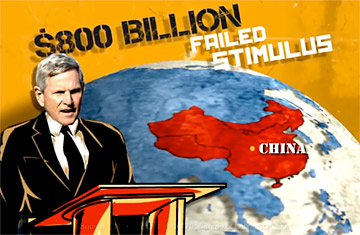
A frame from an attack ad aimed at Rep. Barron Hill (D-IN) who is being challenged by Republican Todd Young
(2 of 2)
Those 9,000 jobs were American jobs. But Iberdrola Renewables, it must be said, is the U.S. subsidiary of a Spanish company. That shouldn't come as a surprise, since foreign firms still rule the wind industry — largely because they've enjoyed such generous subsidies for so long. But back in March, reports that nearly three-quarters of the wind grants went "overseas" inspired the talking points that ended up in the Republican ads. It was four Democratic senators who raised the initial outcry about outsourcing in the stimulus, even though they had supported the legislation. "The point of the stimulus was to create jobs in the United States, not in China," Senator Charles Schumer of New York said at the time. "There is a race going on to pioneer the next generation of clean-energy technologies. We should be building up our domestic industry, not subsidizing our foreign competitors."
The truth is the stimulus is blasting unprecedented cash into U.S. factories for clean-energy products, including solar panels, electric cars and advanced batteries as well as wind turbines. It's a bold experiment in industrial policy, and the results won't be clear for decades. But it's already clear that without domestic wind demand, we wouldn't have a domestic wind industry. It's also clear that without the stimulus, we'd have much less demand, and much more outsourcing.
Yes, Iberdrola's projects inevitably provide some jobs for foreigners; the average wind turbine includes 8,000 components, and while the U.S. now supplies most of its own towers and blades, we're still importing electronics and other parts. But most of the jobs created by Iberdrola's U.S. projects are done by its 875 U.S. employees, and by U.S. installers, truckers and steelmakers as well as manufacturers. "The point isn't the name on the polo shirt," Salerno says. "Foreign investment is a good thing — it creates jobs here."
By the way, wind energy is also a good thing. It reduces our reliance on fossil fuels that are baking the planet and empowering foreign thugs. And the stimulus is also pouring billions of dollars into high-voltage transmission lines that will help connect rural wind projects to population centers. But the Administration and its Democratic supporters have made the mistake of marketing the stimulus almost exclusively as a jobs program; as long as unemployment remains sky-high, it's going to be judged harshly.
Similarly, it's Democrats who tend to traffic in the populist alarmism about outsourcing and China that's being used against them on TV. They can rightfully argue that the Republicans are hypocrites; the stimulus is full of made-in-America provisions that limit outsourcing, and GOP leaders fought them all the way. But some of those provisions are pretty silly; for example, requiring the Department of Homeland Security to buy American-made uniforms just harms the Pakistani textile industry and fosters anti-American resentment at a time when we're deeply invested in the economic and political stability of the region.
Environmentally, the world will be better off if the U.S. and China both invest heavily in renewable energy. Economically, the world will be better off if the U.S. and China both create millions of green jobs. The lesson of globalization is that the world doesn't have to be a zero-sum place, for better and for worse; our subprime crisis can crater your economy, and your sovereign debt crisis can crater our economy. But if globalization is a double-edged sword, so is anti-globalization rhetoric. And the Democrats who have lived by it might die by it in November.
